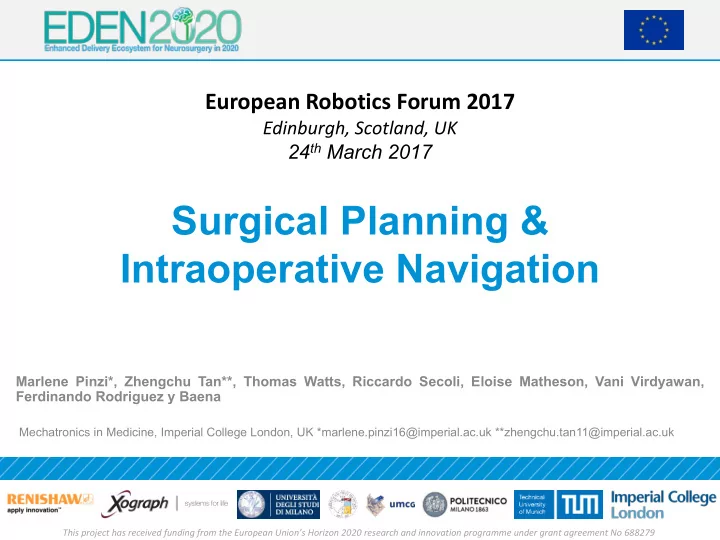

European Robotics Forum 2017 Edinburgh, Scotland, UK 24 th March 2017 Surgical Planning & Intraoperative Navigation Marlene Pinzi*, Zhengchu Tan**, Thomas Watts, Riccardo Secoli, Eloise Matheson, Vani Virdyawan, Ferdinando Rodriguez y Baena Mechatronics in Medicine, Imperial College London, UK *marlene.pinzi16@imperial.ac.uk **zhengchu.tan11@imperial.ac.uk This project has received funding from the European Union’s Horizon 2020 research and innovation programme under grant agreement No 688279
GA 688279 Key Facts about Brain Cancer DATA: Cancer Research UK and EU reports 2
GA 688279 Motivation Curvilinear “no-go” Path • Conventional Keyhole Region Surgery: – Straight rigid needles Straight – Inflexible/limited use Path – Restricted access • How to improve targeting accuracy and account for Target tissue deformation? – Vessels and structures – Tool tissue interactions 3
GA 688279 A Biologically Inspired Approach Reciprocating Eggs pass through here Mechanism Electron microscope view Wasp inserting the ovipositor into the wood Wood Mechanism of Motion 4
GA 688279 The STING concept 5
GA 688279 EDEN2020 at a Glance Raman Imaging System Intraoperative Haptic Console with live US-MR Imaging Fusion 3D US Probe via Secondary Burr Hole Flexible Needle Robotic Fine Transmission Positioner 6
Ultrasound (US) Benefits: • Intra-operative US enables to detect brain shift during neurosurgery • Potential of generating real time 3D images • Convenient and portable equipment Issues: • Difficulty for phisicians in understanding US images • Needs for fully automatic US/MRI registration algorithms This project has received funding from the European Union’s Horizon 2020 research and innovation programme under grant agreement No 688279
We aim to address some of the limitations of current US simulation systems from MRI images : • Computational cost • Input modeling with tissue-specific acoustic properties New database- driven approach, which extends the use of a technique called “Modality Propagation (MP)” to ultrasound This project has received funding from the European Union’s Horizon 2020 research and innovation programme under grant agreement No 688279
GA 688279 MRI Real US MP US 9
GA 688279 Drug Diffusion Modelling Single Axon • Geometry from MRI • Brain microscale: Axons • Directionality affects drug diffusion 10
GA 688279 Synthetic Tissue Phantom • Brain tissue mimicking material: Composite Hydrogel (CH) • PVA and Phytagel blend 11
GA 688279 Main Technological Advancements 12
Thank you... www.eden2020.eu This project has received funding from the European Union’s Horizon 2020 research and innovation programme under grant agreement No 688279
Recommend
More recommend